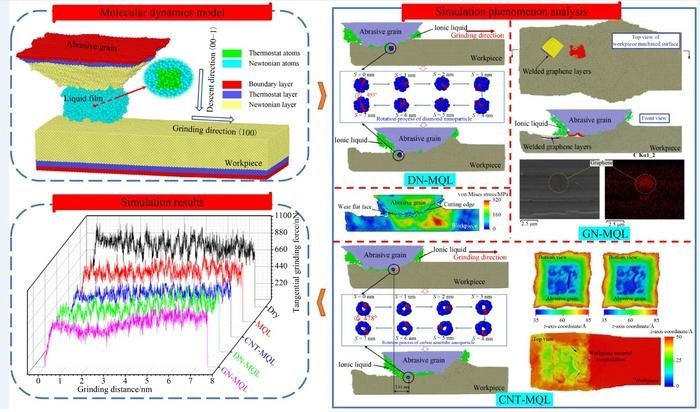As the interaction happening between the workpiece, abrasive grain, and nanofluids on the minimum quantity lubrication (MQL) grinding interface is hard to note instantly, there is yet lack of direct proof to disclose the internal mechanism of carbon group nanoparticles present on the abrasive grain or workpiece grinding interface.

Tribological mechanism of carbon group nanofluids on grinding interface. Image Credit: Higher Education Press Limited Company
Taking this problem into account, the Professor Changhe Li team from the Department of Mechanical and Automotive Engineering of Qingdao University of Technology, China, utilized molecular dynamics simulation to learn about the tribological mechanism of friction-reducing and anti-wear of three types of carbon group nanoparticles, that is graphene, diamond, and carbon nanotubes.
Under MQL conditions, this study will reveal the formation mechanism of the lubrication film on the grinding interface. Depending on this, the tribological behaviors of the nanoparticles on the interface will be examined additionally.
Direct proof will be offered for disclosing the effect mechanism of carbon group nanoparticles present on the grinding interface.
This study could be found in the journal Frontiers of Mechanical Engineering on April 26th, 2023.
Furthermore, carbon group nanofluids could enhance the friction-reducing and anti-wear properties of MQL. But the formation mechanism of the lubrication film produced by carbon group nanofluids on the MQL grinding interface is not completely disclosed as a result of the lack of adequate evidence.
In this study performed, molecular dynamics simulations are executed to explore the interactions on the abrasive grain or workpiece grinding interface and to disclose the formation mechanism of the lubrication film.
Three representative kinds of carbon group nanoparticles, that is., carbon nanotube, nano-diamond, and graphene nanosheet, are taken as research targets, and [BMIM]BF4 ionic liquid is utilized as the base fluid of nanofluids.
Initially, the research reveals the formation mechanism of the lubrication film under the MQL condition with the help of just the ionic liquid. Relying on this, the tribological behaviors of the nanoparticles on the grinding interface are additionally examined to show the tribological mechanism of carbon group nanofluids on the grinding interface.
The investigation showed that boundary lubrication film had been formed on the grinding interface under MQL conditions through the ionic liquid molecules absorbing in the groove-like fractures on the grain wear flat face.
The availability of boundary lubrication film takes the effect of friction-reduction via decreasing the abrasive grain or workpiece contact area. While being subjected to nanofluid MQL conditions, carbon group nanoparticles additionally improve the tribological performances of the MQL method benefitting from their equivalent tribological behaviors on the grinding interface.
The rolling effect of nano-diamond, the rolling and sliding effects of carbon nanotube, and the interlayer shear effect of graphene nanosheet have been included in the behaviors. In comparison with the MQL condition, the tangential grinding forces are additionally decreased by 8.5%, 12.0%, and 14.1% under the carbon nanotube, diamond, and graphene nanofluid MQL conditions, respectively.
This offers direct proof for the effect mechanism of carbon group nanoparticles on the abrasive grain or workpiece grinding interface.
Journal Reference
Wang, D., et al. (2023) Tribological mechanism of carbon group nanofluids on grinding interface under minimum quantity lubrication based on molecular dynamic simulation. Frontiers of Mechanical Engineering. https://doi.org/10.1007/s11465-022-0733-z.